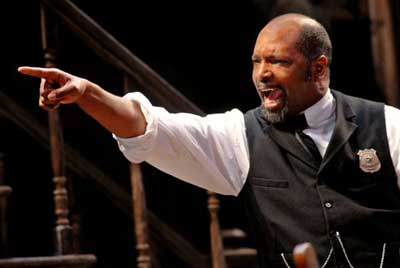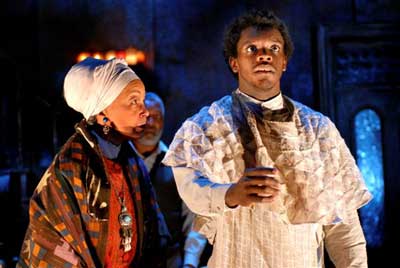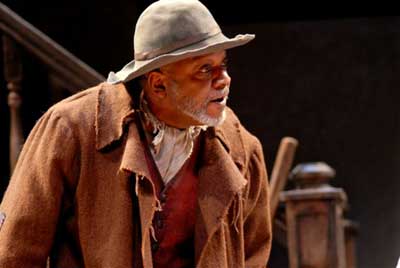|
"I've been singing it for so long
because I love the story of the man
who wrote the song.
Arlo Guthrie
Albert Finney's portrayal of the repentant slaver John Newton in the film "Amazing Grace" is a high dudgeon performance explored under strict control. Finney leaves in more by holding back much. The actor has restraint written all over his face, while absorbed in Newton's wrenching struggle with guilt. Newton is not looking for sympathy, for he has no sympathy left for himself. His every day turmoil, an expense of spirit in a waste of shame, is tied to a tongue that doesn't waste words.
From his first appearance, pushing a mop on the floor, we know where Newton is coming from. Newton's turmoil of conscience over his calculating and brutal abuse of African slaves, chain ganged in 20 ships over to the brave New World (really the old one in disguise), has depth and resonance. John Newton was no petty Walmart CEO posing as a community benefactor. A full flush slaver, who later, in the 18th century, became an evangelical minister, Newton composed the remarkable song "Amazing Grace". A Christian hymn (originally titled "Faiths Review and Expectations"), the song evolved into an anthem for Civil Rights protesters in the sixties, and was also the most performed song for memorial services after the devastation of 9/11.
Spurred on by Newton's words, and the stirring of his own conscience, abolitionist and anti-slavery pioneer William Wilberforce (Ioan Gruffudd) spear headed the end of the slave trade in the British empire. Elected to the House of Commons at the age of 21, Wilberforce was also tormented by his conscience – mostly liberal and untested. After a series of rejections, he evolved into an articulate debater and managed to convince the English power elite to end the slave trade in the early 19th century. All done with the help and constancy of supporters like Pitt the Younger (Benedict Cumberbatch), at 24, the youngest Prime Minister in England's history; and Olaudah Equiano (Youssou N'Dour), a former slave who worked and bought his way out of slavery, publishing The Interesting Narrative of the Life of Olaudah Equiano, or Gustavus Vassa the African. The book gained popularity as the debate over the slave trade intensified, and may have also inspired "Narrative of the Life of Frederick Douglas (An American Slave Written by Himself)".

When Wilburforce rolls out a petition on the floor of the English parliament, loaded with the names of protesters, the effect resonates. For the life of me, I can not imagine a debate on the floor of the American Congress, or for that matter, the Supreme Court, that doesn't adhere to the rules of the game of how to keep order and get things done – mostly under the table. What goes on behind closed doors in the American Congress, the Supreme Court, or the English Parliament, surely is the name of the game. But at least, in the Parliament, significant debate takes place in a straight forward, round-robin of conflicting ideas, policies and revelations, where no one is left off the hook: especially those in power. Debate is out in the open, in rapid fire exchanges, where it belongs; and that makes it public property. You don't need a media "political commentator" to know which way the wind blows. In a heated debate, the cover of power has the potential of being blown away – and that's a plus. And that is exactly what happens in "Amazing Grace": progress spurred on by a dedication to righting a pervasive, morally degenerate wrong.
Director Michael Apted, for the most part, uses compelling suggestive imagery to face up to the ugly realities of slavery. Unlike the prolonged sado-masochism of Mel Gibson's "The Passion of the Christ", in "Amazing Grace" we fill in the images, engaged by what is left out, imagined, or fleetingly realized on screen. An altering shift of visual intensity and aural resonance that reflects the abomination of slavery: Chains dangling in the empty rafters of a creaking slave ship docked in England; glimpses of the sweating bodies of people shackled together and vomiting in the hull of a slave ship, during a storm crossing the Atlantic; and a glance at the despairing and wrenching separation of families in America's slave markets. If you didn't see it, and it went right by, you'd never know it was there.
Gem of the Ocean
August Wilson's "Gem of the Ocean" is one of the final plays of his ten play 20th century cycle of plays, taking place, as do the other plays, in the Hill district, Pittsburgh, Pennsylvania - circa 1904. It is the first play in the cycle, and the next to last one he wrote before his untimely death from liver cancer in 2005. The Geva Theatre in Rochester, New York has dedicated five seasons to staging ten plays by the Pulitzer Prize winner. A well deserved homage to a playwright, up there with Eugene O'Neill, Tennessee Williams, and Arthur Miller, all identified with a specific cultural setting. And all sharing the destiny of American families.
"Gem of the Ocean" has operatic dialogue, magic, and emotional impact, in a context both realistic and suggestive of a spiritual realm. An epic play, with an other worldly approach, the play is a theatrical dual between the law as representative of oppression, and the deep seeded human urge for freedom.
"People don't understand the law is everything", Caesar Wilks (David Alan Anderson), tells his sister Black Mary (Rachel Leslie). "There ain't nothing above the law. That's what I try to tell those niggers. Everything come under the law. You got to respect the law, unless you dead." Caesar Wilks is a constable, a black man, dead set on straightening up his people to fly right by paying attention to the "law" – at all costs. Anderson's hulking, sharply defined interpretation of Wilks, full of rage, reveals self hatred at its most declamatory viciousness. Hardly aware of his own fault line, for Wilks only the law counts. Whatever harm it might do to people, follow the law. And that's an order.

Aunt Ester Tyler (Lizen Mitchell), the ageless 275 year old spiritual guide of this poetic play, carries within a grasp of ancestral memory, a history that she uses to restore the soul of anguished people, through the cleansing of pain, guilt, humiliation and the occupational hazard of self denial. A commanding figure, a benevolent spirit in residence, but it when comes to rooting out despair, Aunt Ester can be as tough as nails. A faith healer in the truest sense of the word, Aunt Ester gives breathing space to a lost soul in turmoil; an opportunity to emerge whole again. And it ain't easy.

Citizen Barlow (Chris Chalk) is that lost soul in turmoil. When the young man from Alabama shows up at Aunt Ester's door, Ely (Cedric Turner), Aunt Ester's gate keeper, tells him that this is a "peaceful" house and Aunt Ester won't see him until Tuesday. He waits outside like a shadow of a prophecy who won't take no for an answer. Finally he slips through a window upstairs and confronts Aunt Ester. "I ain't gonna harm nobody", he says. "I ain't looking for no money. I ain't no robber. I come to see you". Citizen Barlow reminds Aunt Ester of her lost son, Junebug, the only one of her boys who caused her "trouble". The bonding between them takes place.
Suddenly Citizen Barlow dumps a slew of nails out of his pockets, and they hit the floor hard - resonating with guilt. Citizen Barlow has come to pay his dues. He is the one who stole the box of nails that everyone is talking about. For it wasn't Garret Brown who did the crime, it was Citizen Barlow. Rather than be forced by Caesar Wilks to admit that he was a thief, Garret Brown jumped into the river to drown. Caesar Wilks repeatedly hit the innocent man over the head with a two by four, trying to force a confession out of him in the name of the law. Brown did not give in. He let himself sink into the deep, rather than admit guilt about something he did not do. And Citizen Barlow? He has come to Aunt Ester to own up to the crime, redeem himself, and discover a reason to live.
Aunt Ester and Solly Two Kings (Ernest Perry, Jr.), a former underground railroad conductor, who carries a stick full of notches that count the number of people he led from slavery, lead Citizen Barlow on a journey to the City of Bones. Here, beneath the Atlantic, in an ocean of memory, lies the bones of slaves, dumped into the ocean while crossing the Atlantic into slavery. Memory glows in the bones, like a gem, and in the beautiful singing heard below. Among them is Garett Brown. And it is here, in this imaginative confluence of bones, that Citizen Barlow hears the singing of Garret Brown, and is redeemed.

August Wilson's plays are operatic in thrust and volume. His search for truth, coupled with imaginative poetic gifts, make mince meat of his distracters quibbling concerns about dramaturgy. You don't have to play footsie with the rules of the playwright game to reach people. Gem is a pearl dropped into an ocean of memory that resonates through the history of African Americans. People who arrived in America against their will, survived slavery, and struggled to gain freedom from one generation to the next. When it comes to the law, as we now know from history, repeated over and over again
"There is but one agitator and his name is injustice"
Citizen Tom Paine
GEVA Images by Huthphotos
|
